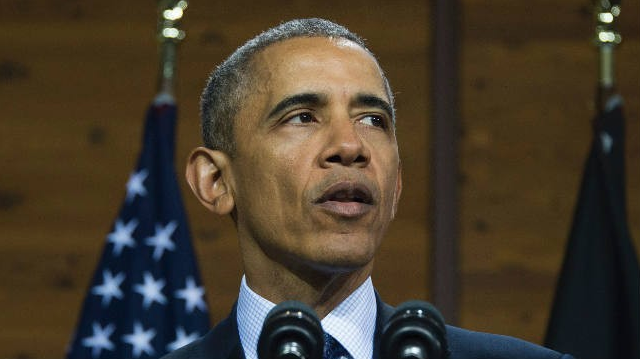Republican front-runner Donald Trump‘s warning against the “false song of globalism” strikes a sharply different note than President Obama did in his recent performance in London.
Obama has provided further evidence that the Trans-Pacific Partnership (TPP) more closely resembles a scheme for international governance like the European Union rather than a traditional trade agreement.
When Obama penned an editorial telling the British people they should vote to remain in the EU, among the reasons the president cited were the Trans-Atlantic Trade and Investment Partnership (T-TIP), the EU-U.S. companion to his wildly unpopular TPP.
He was asked at a joint news conference with Prime Minister David Cameron what would happen if Britain decides to leave the EU. Being painfully — if not insultingly — clear, he said Britain would be “in the back of the queue” and there wouldn’t be a U.S.-U.K. free trade agreement anytime soon. The reason: “our focus is in negotiating with a big bloc” like the European Union, “rather than trying to do piecemeal trade agreements.”
The president was reinforcing what U.S. Trade Representative Michael Froman said back in October: “We’re not particularly in the market for FTAs [free trade agreements] with individual countries. We’re building platforms … that other countries can join over time.”
“Platforms other countries can join over time” describes the Trans-Pacific Partnership — and the European Union. Indonesia, the Philippines and Taiwan have already expressed interest in joining the TPP, and the president has said he envisions China entering the club.
While this “docking mechanism” distinguishes the TPP from say, NAFTA, it’s not the only aspect that puts this more into the category of an economic union rather than a conventional trade pact.
The White House says the TPP is a “living agreement” that will be updated to address future issues “as well as new issues that arise with the expansion of the agreement.”
Who does the updating is, of course, the rub. The power to “amend or modify” the agreement is vested in the Trans-Pacific Partnership Commission. The commission oversees the pact’s implementation and interpretations of the agreement through decision-making procedures that effectively cut the U.S. Congress out of the process.
In its scope and powers, the Tran-Pacific Partnership Commission is analogous to the European Commission, the unelected rule-making body of the EU to which Europe’s national parliaments bow.
And like the EU, the TPP seeks to establish a supranational entity where “people, goods and money” will flow freely. That’s how Japanese Prime Minister Shinzo Abe described TPP after meeting with Obama last year.
 Listen Online
Listen Online Watch Online
Watch Online Find a Station in Your Area
Find a Station in Your Area










 Listen Now
Listen Now Watch Online
Watch Online
